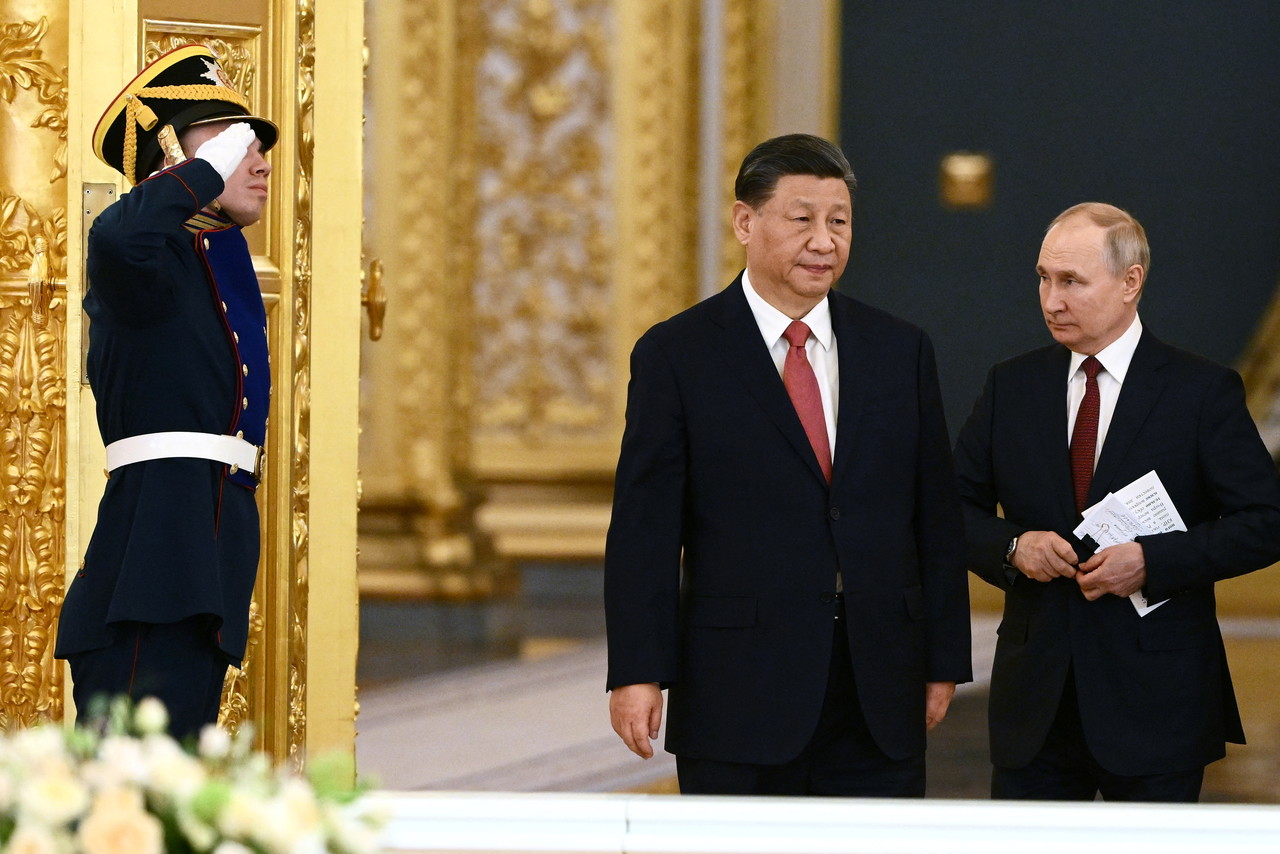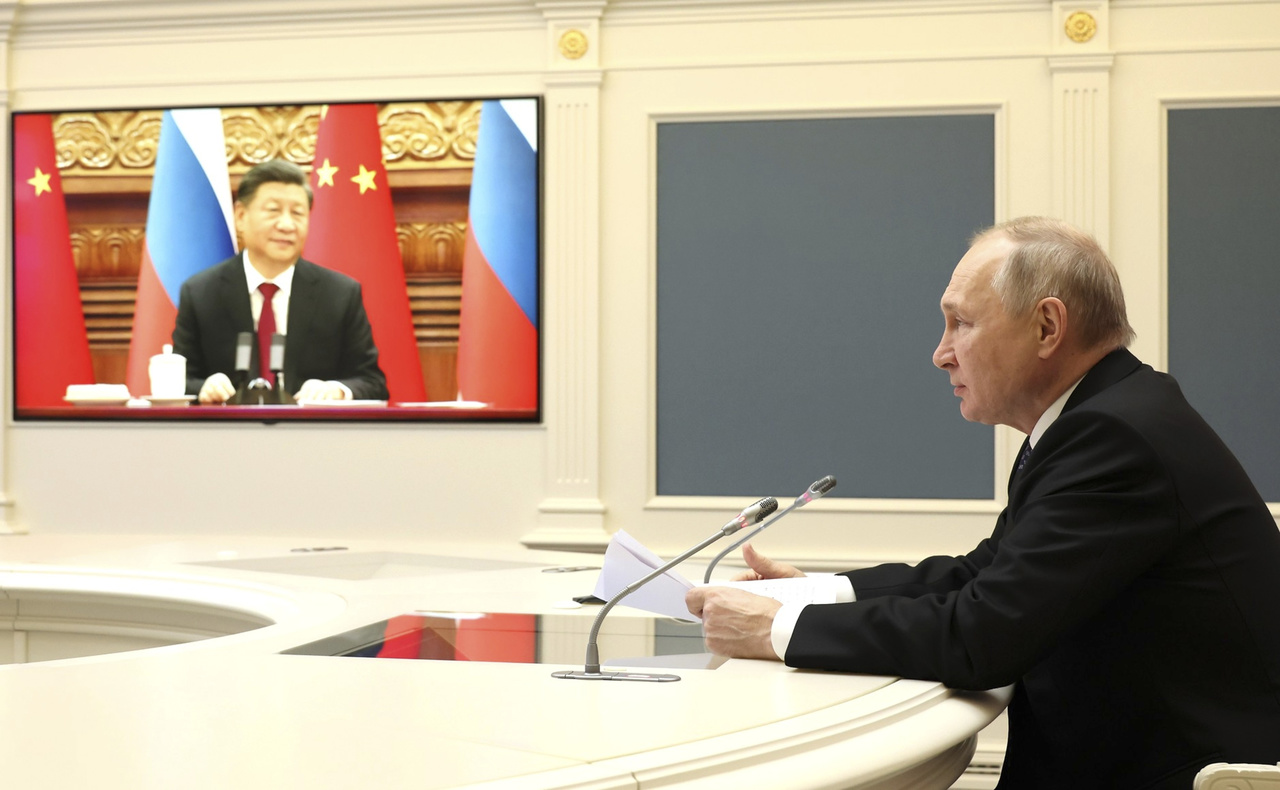China-Russia: Strategic Partners Strengthening Cooperation
The cooperation between China and Russia has strengthened in the face of the Russian aggression against Ukraine and the common goal of weakening the West. This was confirmed by Xi Jinping’s visit to Moscow, which ended on 22 March. Chinese economic and diplomatic support, but also dual-use technologies, makes it easier for Russia to wage war. This increases the need to intensify U.S. and EU efforts in providing assistance to Ukraine and supporting the implementation of the interests of the Global South, which are receptive to the anti-Western message of Russia and China.
 SPUTNIK / Reuters / Forum
SPUTNIK / Reuters / Forum
Xi Jinping’s visit to Russia (20-22 March) did not bring any significant new initiatives, but was rather a renewed declaration of the intensification of bilateral cooperation, including the development of economic relations until 2030. In relation to the prolonged conflict in Ukraine and the weakening of Russia, China expressed its disagreement with unilateral Western sanctions. At the end of 2022, the first telephone conversation between Vladimir Putin and the Chinese leader took place after Xi Jinping was re-elected in October as secretary-general of the Communist Party of China. They confirmed the strategic dimension of relations between the two countries. At that time, the Russian leader also invited Xi to pay a visit to Russia in 2023.
China’s Position
China sees Russia as a weaker and less predictable partner in the competition with the United States. It does not want Russia to lose the war in Ukraine because it would mean a stronger West. In China’s view, the “no-limit partnership” with Russia, established in February 2022, just before the invasion of Ukraine, remains a priority. It provides Russia with diplomatic and economic support through the purchase of Russian energy resources and the export of semiconductors and helps it evade sanctions by supplying military and dual-use technologies, such as aircraft components, navigation technologies, and satellite imaging. It also strengthen cooperation between the armed forces of the two countries, which was included, among others, in the final statement after Xi Jinping’s visit to Moscow.
In the international arena, China presents postulates that, at first glance could be seen as inconvenient for the Russian side. This was reflected in the “Chinese position on a political solution to the Ukrainian crisis”, the declaration by the Chinese Ministry of Foreign Affairs published on the first anniversary of the Russian full-scale invasion, as well as in the stance of both countries on this war expressed during Xi’s visit to Moscow. The statement contains the most important conditions China presented over the last year regarding the war in Ukraine. They include, for example, disagreement with the use of nuclear weapons (without indicating the party responsible for the threat of such an attack), threats to nuclear power plants (Chinese media had previously suggested the possibility of such attacks by Ukrainians), respect for the sovereignty and territorial integrity of all countries (without indicating Ukraine), and rejection of a “Cold War mentality” expressed through military blocs. The document is intended to suggest China’s impartiality and allow it to portray itself as a state capable of mediating in the matter of the war in Ukraine, as well as strengthening global security. In this way, the proposals align with pro-Chinese and anti-American sentiments present in the public debate of some EU countries, such as Germany, Italy, or France. They also correspond to the expectations of the Global South, states already with a negative or distrustful attitude towards the West.
It is crucial for China to maintain Russia’s confrontational policy towards the West, including in the military dimension because it is associated with the continuation of authoritarian rule in Russia. Depending on the degree of threat to the implementation of China’s goals, it is therefore ready to expand cooperation (possibly even through significant arms deliveries) with Russia. According to unofficial information, limited amounts of weapons and spare parts are already being supplied by China. It also maintains diplomatic support for its partner, for example, on 23 February this year, China abstained from a vote on a UN resolution on the cessation of hostilities by Russia and the withdrawal of its troops from Ukraine, supported the Russian motion in the UN Security Council to investigate the involvement of the U.S. in the Nord-Stream gas pipeline explosion, and jointly with Russia blocked the adoption of communiqués condemning the war in Ukraine after meetings of foreign affairs ministers of the G20 in New Delhi at the beginning of March this year.
Russia’s Goals
China’s support is crucial for Russia. Russia’s short-term goal is to force Ukraine to recognise Russian territorial gains (in particular the four oblasts annexed in September last year). The Chinese proposals to settle the “Ukrainian crisis” are part of Russian policy of exerting international pressure on the authorities in Kyiv to agree to the presence of the Russian military on Ukrainian territory (China did not specify the condition of withdrawal in the proposal). Negotiations may prove useful for Russia to use the time to regroup and strike again in the future. Russia is not yet ready for talks, but the odium of rejecting China’s so-called “peace deal” would fall to the Ukrainian side.
Due to the sanctions introduced by the West, Russia entered 2023 with a budget deficit (in January, it was estimated at RUB 1.776 trillion, or about $23.5 billion). By circumventing sanctions, it has sold energy resources (crude oil, natural gas), for example, in Asia, including China, India and Turkey. In 2022, China became Russia’s most important trading partner as the value of bilateral trade in goods increased by 30% to more than $190 billion. However, the export of raw materials to China so far has not offset the income from sales to the EU, in part because Russia’s is reportedly offering rebates of $30 per barrel of oil. However, even at lower prices, China’s economic and financial support allows Russia to continue the war in Ukraine.
Consequences for the EU and the U.S.
The deeper political and economic, and potentially also military, cooperation between China and Russia is the most important challenge for international security, from the EU and U.S. perspective. This was communicated to China by both U.S. Secretary of State Antony Blinken and the EU High Representative for Foreign and Security Policy Josep Borrell during meetings with Chinese Politburo member and former Foreign Minister Wang Yi at the Munich Security Conference in February this year. If China supplies Russia with, for example, artillery ammunition, that would make the war in Ukraine a new dimension of the China-U.S. rivalry. It would force Western countries to increase support for Ukraine, prolong the conflict even further, and come with negative social and economic effects.
Conclusions and Perspectives
China-Russia cooperation is of strategic and long-term importance for both countries. China’s recently intensified diplomatic efforts regarding the war in Ukraine, as well as far-reaching declarations of cooperation in many sectors made by Xi during the meeting with Putin in Moscow, show that the Chinese do not want Russia to be defeated in Ukraine. In the symbolic dimension, especially after an arrest warrant for Putin was issued by the International Criminal Court, the outcome of Xi’s visit to Russia, and Chinese information policy, which is often convergent with Russian messaging, confirm China’s support for the aggressor. One cannot count on China’s impartiality in ending the Russian aggression in Ukraine.
The political declarations of an in-depth partnership with China strengthen Putin’s position as one of the leaders of a group of countries hostile towards the West, including Iran, Syria, and Venezuela. For the leaders of non-democratic countries, cooperation with China and Russia is often a condition for the survival of the regime. In this way, both Russia and China position themselves towards parts of the Global South as “patrons” with the potential for material support in response to the “hegemony of the West”. China and Russia’s peace declarations are based on their interests, including territorial expansion and strengthening the power of authoritarian leaders. The West should strive to deter China from possible involvement in the conflict by, for example, signalling disagreement with its support for Russia (also in multilateral forums, such as the G7 or G20) and declaring sanctions on selected Chinese entities similar to those introduced by the U.S. in January this year on one of the companies from China for cooperation with the Wagner Group. EU and U.S. Information policy towards the Global South should focus on the positives resulting from an international order based on law, as well as mitigating the effects of the war and sanctions on Russia for developing countries. It is crucial to tighten economic cooperation between the EU and the U.S. with partners in, for example, Southeast Asia or Africa.




_sm.jpg)
